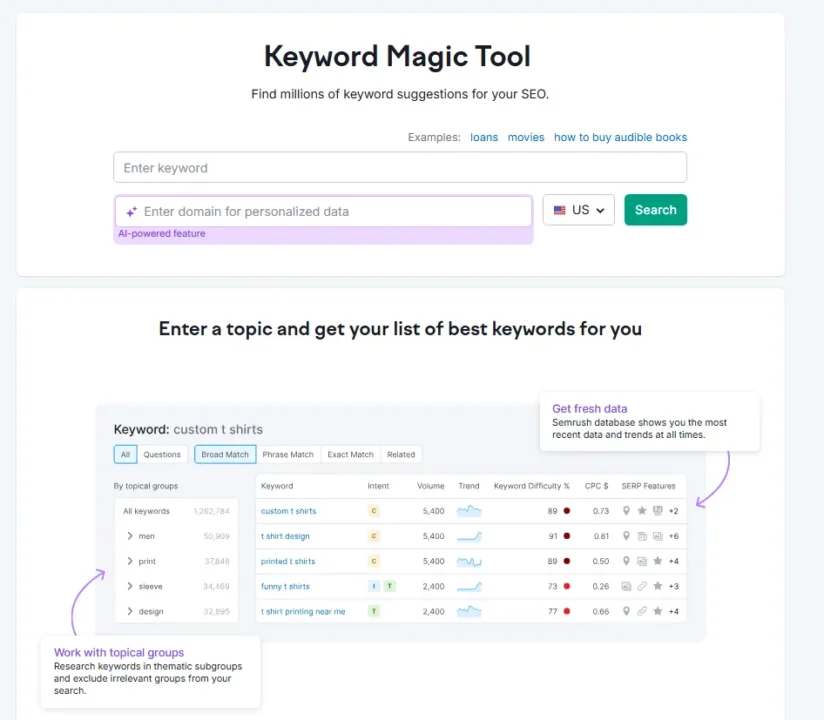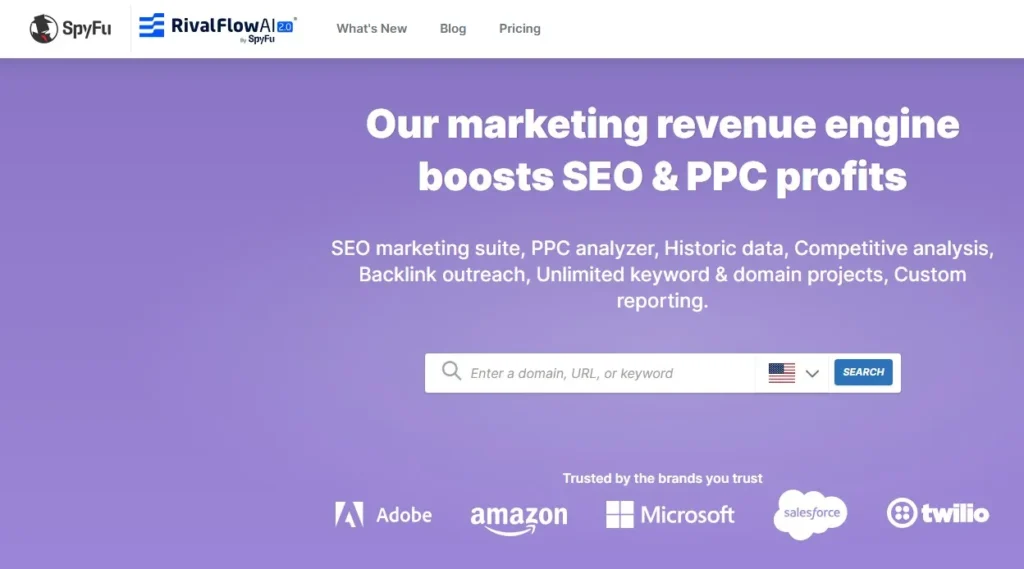Table of Contents
Keyword research plays a backbone role in digital success. Whether you’re aiming to dominate organic search rankings, run PPC ads, or create a blog that connects with your audience, choosing the right tools can make all the difference. This blog dives into the best keyword research tools for 2024, outlining their features, usage tips, and examples. Let’s get started!
Top 10 Best Keyword Research Tools
Tool #1: Ahrefs Keywords Explorer
Short Description: Ahrefs is a powerful tool offering deep insights into keyword metrics, SERPs, and competitor analysis.
Features
- Extensive keyword database for platforms like Google, YouTube, and Amazon.
- Keyword difficulty scores and traffic potential insights.
- SERP analysis and competitor research.
How to Use
- Log in & “Keywords Explorer.”
- Enter a seed keyword (e.g., “digital marketing tips”).
- Analyze metrics like search volume, clicks, and trends.
Example Use Case
For an eCommerce store, search “wireless earbuds” to find high-potential related terms like “best wireless earbuds under $100.”
Tool #2: SEMrush Keyword Magic Tool

Short Description: Semrush feature-packed tool for finding keywords, analyzing competitors, and optimizing campaigns.
Features
- 20+ billion keyword suggestions.
- CPC, search volume, and competitive density analysis.
- Competitor keyword tracking.
How to Use
- Go to “Keyword Magic Tool“.
- Enter a keyword (e.g., “social media marketing”).
- Sort results by metrics like search volume or CPC.
Example Use Case
A fitness blogger can find low-competition keywords like “15-minute home workouts for beginners” to attract niche readers.
Tool #3: Google Keyword Planner
Short Description: Google Keyword Planner is free tool for identifying PPC and SEO keywords.
Features
- Displays historical search volume and competition data.
- Offers keyword suggestions by industry or URL.
- Provides traffic forecasts.
How to Use
- Log in Google Ads & check “Keyword Planner.”
- Enter a keyword or URL.
- Explore suggestions and metrics like search volume.
Example Use Case
A local café can use “best coffee shop” to identify keywords like “coffee shop near me.”
Tool #4: Moz Keyword Explorer
Short Description: Moz is a beginner-friendly tool that prioritizes search intent and click-through rate analysis.
Features
- Predicts CTR based on user behavior.
- Tracks keyword rankings over time.
- Provides a “Priority Score” for easy decision-making.
How to Use
- Enter a keyword (e.g., “healthy recipes”) in the Moz Keyword Explorer.
- Review metrics like Priority Score.
- Save keywords for tracking and comparison.
Example Use Case
Food bloggers can find terms like “quick healthy recipes for dinner” to target high-CTR opportunities.
Tool #5: Ubersuggest
Short Description: Ubersuggest is an all-in-one keyword tool that also provides content ideas and SEO audit reports.
Features
- Offers keyword suggestions and SEO difficulty metrics.
- Tracks top-performing pages and backlinks.
- Includes a Content Ideas feature for blog inspiration.
How to Use
- Input a keyword (e.g., “content marketing tips”) into Ubersuggest.
- Analyze suggestions and SEO metrics.
- Use the Content Ideas tool to create related posts.
Example Use Case
A marketer can optimize a blog post for “content marketing for startups” using insights from Ubersuggest.
Tool #6: KWFinder by Mangools
Short Description: KWFinder is focused on finding low-competition, long-tail keywords for niche markets.
Features
- Highlights long-tail keywords with difficulty scores.
- Offers SERP analysis and keyword trends.
- Groups keywords into categories.
How to Use
- Input a keyword like “budget travel destinations.”
- Review keyword difficulty and SERP analysis.
- Export and organize results for content planning.
Example Use Case
Travel bloggers can target phrases like “budget-friendly European destinations for 2024” for unique content.
Tool #7: AnswerThePublic
Short Description: AnswerThePublic visualizes search intent and questions related to your keyword.
Features
- Categorizes user queries into questions, comparisons, and prepositions.
- Generates data in visually appealing formats.
- Great for content gap analysis.
How to Use
- Enter your keyword (e.g., “vegan diet”).
- Browse visual maps of user queries.
- Export results for use in content planning.
Example Use Case
Nutritionists can answer audience queries like “why is a vegan diet healthy?” in blog posts or videos.
Tool #8: Serpstat
Short Description: Serpstat is a versatile tool for keyword research, rank tracking, and site audits.
Features
- Offers keyword clustering and SERP analysis.
- Provides backlink and PPC ads data.
- Tracks performance metrics over time.
How to Use
- Enter a keyword in Serpstat’s “Keyword Research” section.
- Use filters for regional insights.
- Cluster keywords for focused campaigns.
Example Use Case
Marketers running international campaigns can uncover region-specific terms like “best digital marketing agencies in Europe.”
Tool #9: Keyword Surfer
Short Description: Keyword Surfer is a lightweight Chrome extension showing keyword data directly in search results.
Features
- Surfer provides 1. search volume, 2. CPC, & 3. related keywords.
- Lightweight and user-friendly interface.
- Ideal for quick keyword insights.
How to Use
- Install the extension.
- Search for a term on Google (e.g., “online courses”).
- Review metrics displayed alongside the search results.
Example Use Case
A course creator can identify trending terms like “best online courses for coding” without leaving the search page.
Tool #10: SpyFu

Short Description: Spyfu focuses on competitor keyword and PPC campaign analysis.
Features
- Tracks historical keyword performance and ads.
- Uncovers competitor strategies.
- Provides detailed backlink analysis.
How to Use
- Search for a competitor’s domain in SpyFu.
- Analyze their top-performing keywords and campaigns.
- Use these insights to refine your strategy.
Example Use Case
SaaS businesses can identify and target keywords like “best project management software” based on competitor data.
Comparison of the Best Keyword Research Tools in 2024
Here’s a detailed comparison of the top tools based on features, ease of use, pricing, and best use cases:
| Tool | Features | Ease of Use | Pricing | Best Use Case |
| Ahrefs Keywords Explorer | Extensive keyword database, keyword difficulty, SERP analysis. | Moderate | Starts at $99/month | Ideal for in-depth competitor research and multi-platform keyword strategies. |
| SEMrush Keyword Magic Tool | 20+ billion keywords, CPC/density metrics, competitive analysis. | Moderate | Starts at $119.95/month | Perfect for creating PPC campaigns and tracking competitor strategies. |
| Google Keyword Planner | Free tool, historical data, traffic forecasts. | Easy | Free | Best for PPC-focused keyword research and starting SEO for small businesses. |
| Moz Keyword Explorer | Priority score, CTR analysis, rank tracking. | Easy | Starts at $99/month | Great for beginners focusing on search intent and CTR optimization. |
| Ubersuggest | SEO metrics, backlink tracking, content ideas. | Easy | Free basic plan, Pro at $29/month | Suitable for small businesses and bloggers looking for cost-effective keyword research tools. |
| KWFinder by Mangools | Long-tail keywords, difficulty scores, trend analysis. | Easy | Starts at $29.90/month | Ideal for targeting low-competition niches and organizing keywords. |
| AnswerThePublic | Visual maps of search intent and queries, content gap insights. | Easy | Free basic plan, Pro at $99/month | Excellent for content creators aiming to address audience queries effectively. |
| Serpstat | Keyword clustering, SERP analysis, performance tracking. | Moderate | Starts at $69/month | Versatile for SEO professionals handling multiple campaigns. |
| Keyword Surfer | Chrome extension, displays search volume and related terms in SERPs. | Very Easy | Free | Perfect for quick keyword insights directly from Google Search results. |
| SpyFu | Competitor analysis, historical keyword performance, PPC tracking. | Moderate | Starts at $39/month | Best for uncovering and analyzing competitor strategies for both SEO and PPC. |
Key Insights:
- Ahrefs and SEMrush are premium tools for advanced users and businesses.
- Google Keyword Planner and Keyword Surfer are free and beginner-friendly options.
- AnswerThePublic and KWFinder are great for creative and niche-specific research.
Conclusion
Keyword research tools are your ultimate allies in the digital marketing battlefield. There is options from the free plan to the premium. The key is to match the tool to your goals, stay updated on trends, and never stop experimenting.
FAQs
1. Which is the best free keyword research tool?
Google Keyword Planner and AnswerThePublic are excellent free options.
2. Can multiple tools be used for keyword research?
Absolutely! Combining tools often gives better results.
3. How often should I conduct keyword research?
At least once a quarter to keep up with trends and changes in your industry.
4. Are paid keyword tools worth the investment?
Yes, especially if you’re serious about scaling your digital marketing efforts.
5. Difference between long & short tail keywords?
Short-tail keywords are broad and competitive, while long-tail keywords are specific and easier to rank for.

